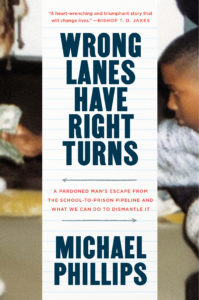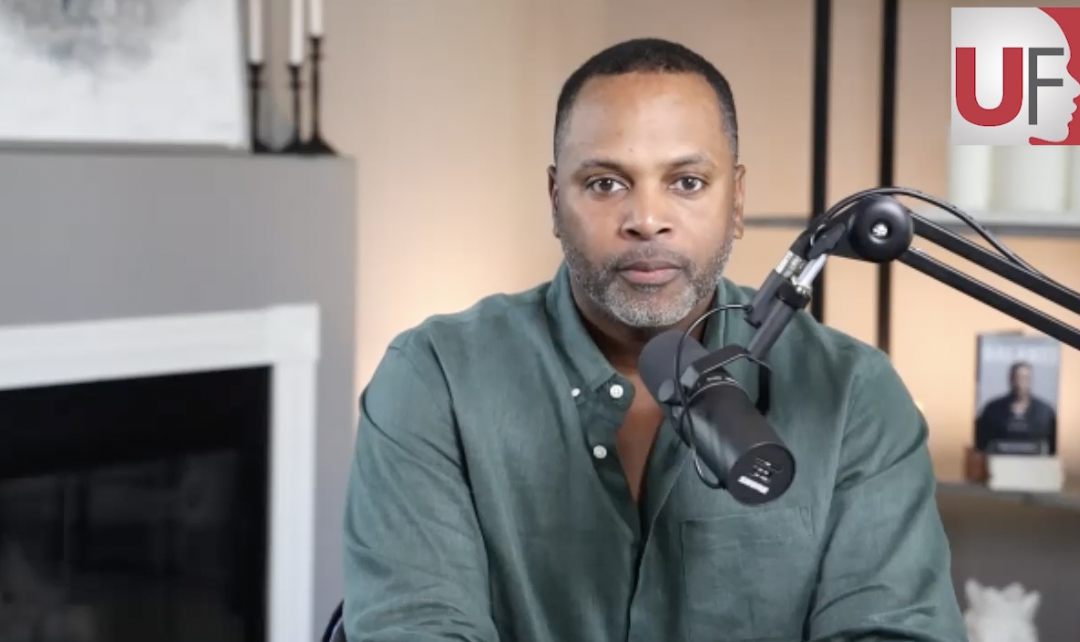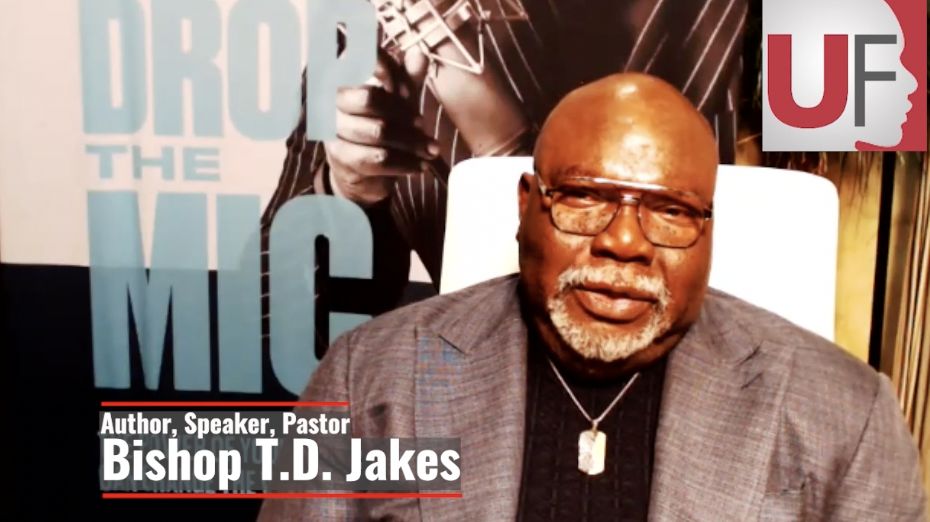
by Allen Reynolds, UrbanFaith Editor | Oct 26, 2023 | Commentary, Headline News, Social Justice |
Michael Phillips is the Chief Engagement Officer of the TD Jakes Foundation, a well respected pastor and education advocate. But his journey was not easy or simple. His book Wrong Lanes Have Right Turns details his journey, his context, and his perspective on one of the most important topics for us everyday: how to educate our children and dismantle the school to prison pipeline. He masterfully blends personal stories with scripture, statistics, history, and context to help us understand and impact the education system. Check out the full interview above!

You can get the book here


by Allen Reynolds, UrbanFaith Editor | Apr 19, 2022 | Commentary, Faith & Work, Headline News |
UrbanFaith sat down to interview Touré Roberts, the visionary leader and founder of ONE (formerly OneChurch LA) to discuss his new book Balance.
Touré Roberts is a man who wears many hats. He is a husband, father, producer, pastor, author, speaker, and business executive with churches and homes in two cities. His wife Sarah Jakes Roberts who wrote the foreword to his most recent book is one of the most sought after speakers in the country. Saying Roberts needs balance to maintain his success is an understatement. But Touré has uncovered an unconventional approach to balance…as a place to live from. An overview of the book is below.

Imagine learning to tap into the awareness, the sensitivity and highest thought patterns that enable the most successful outcomes in life, love and business. What would your life look like if you were able to break the patterns of inconsistency that keep you from your absolute best? These goals are not only possible—they are what you were made for! In Balance, bestselling author Touré Roberts guides us on the eye-opening journey that unpacks the divine formula that makes this a reality. This illuminating guide brings a unique and eye-opening perspective to the evasive concept of balance.

by Maina Mwaura, Urban Faith Contributing Writer | Jan 10, 2022 | Commentary, Headline News |
As we navigate change in our world caused by the pandemic, social, economic, and governmental transformation, wisdom of all types is necessary. Leaders are trying to find new ways to engage those they lead and everyone is working to communicate more effectively in our dynamic moment.
UrbanFaith sat down with one of the most influential leaders in the world, Bishop T.D. Jakes who has seized the opportunity to share his insight and experience on how to remain faithful to our purpose as we communicate in our dynamic context. In his new book Don’t Drop the Mic he shares his wisdom on how to faithfully communicate regardless of the audience. It has been called one of Bishop Jakes’ best books as he explores clear and effective communication in our everyday lives and on the world’s biggest platforms. Bishop Jakes has led a megachurch with tens of thousands of members, The Potter’s House for decades, become an entrepreneur, filmmaker, talk show host, producer, and raise his children without dropping the mic. Two of his children are now successful pastors in his ministry network, Sarah Jakes Roberts and Cora Jakes Coleman. This book explores how he stayed true to his message while adapting his method through the years. Full interview is linked above.
by Urban Faith Staff | Jan 22, 2013 | Headline News |

Roughly 12,000 people participate of the inauguration ceremony of the Christian Fraternity of Guatemala evangelical church in San Cristobal, municipality of Mixco, south of Guatemala City. (Photo: Orlando Sierra -AFP/Getty Images)
The million dollar question: Should I attend a megachurch? Christians fall on both sides of the debate. Let’s begin with a definition. Most define a megachurch as a congregation with more than 2,000 members. Based on this definition, there are over 1,300 megachurches in America. Megachurch proponents cite the size of the church as a “practice run”, as we are sure to worship with millions of folks in heaven. One cannot overlook the impact of aggregate finances (when used properly) for missions work. On the flip side of the coin, smaller congregations offer intimacy that many believe makes for authentic, real relationships. On top of that, many believe that smaller churches are less political than larger congregations. As a catalyst for reflection, consider the following four reasons that many Christians offer for refusing to step into a megachurch.
1. Scandals
Nobody likes a hypocrite. It rubs people the wrong way when someone talks out of both sides of the mouth. Over the past several decades, we’ve seen numerous scandals unfold in the media (including social media). In most instances, the scandals are attributed to pastors of large megachurches. The truth is, media outlets are really not as interested in small-town scandals. When they get wind of a larger, more prominent pastor’s moral failures, they generally prefer these stories (and usually run them into the ground).
Here’s the problem with this approach. We tend to attribute the actions of one person to an entire group. That God entrusted His Church to men and women can be both a blessing and a curse. We are blessed to be vessels of God’s grace, but sometimes those vessels are jacked up, flawed, and fall short of his plan for our lives. Truth be told, for every scandal in a megachurch, there are countless others who operate in integrity and hold themselves accountable. Don’t let the vices of a few cause you to place all others in the same category.
2. Biblically “Un”Sound Teaching
There’s a fine line here. It’s important to affirm revelatory words spoken through God’s Spirit. However, it’s almost always a red flag when passages are out of context. Again, traditional media and social media has (in some instances) caused many to doubt the teachings of many megachurch pastors. I remember clearly a 20/20 story that ran several years back on Fred Price. It purported that one of Price’s sermons bragged about his lavish lifestyle, when in fact it did not. You can see the rebuttal report (which includes the entire sermon) here.
Lamentably, there are pastors who teach wrong doctrine. But it’s unfair to put pastors into a certain category based on a few sermons they preach. If someone preaches on stewardship four weeks a year, does that make him or her a prosperity pastor? Certainly not. One may justly wonder about “Dr.’s” who have not completed required coursework to attain a Doctorate level degree, but it’s a sign of charity to withhold judgment of their preaching/teaching until hearing an entire message or more than one or two sermons.
3. Financial Irresponsibility
Some years ago, the Senate launched an investigation requesting financial information from several prominent televangelists. Last year, the investigation concluded with no definitive findings of wrongdoing and no penalties imposed as a result of the inquiry. It’s not surprising that the results of the investigation didn’t get as much air time as the investigation itself. True enough, financially irresponsibility is reprehensible – especially when it comes to men and women of God. Yet the ultimate question is whether ministers of the Gospel should live lifestyles comparable to Hollywood celebrities? There are at least two sides of the coin here. One side: children have someone other than athletes and musicians to look up to. Other side: Prosperity and ministry are like oil and water. Jesus wasn’t prosperous, so pastors shouldn’t be.
How much is too much in the context of ministry? We reward others based on their talents and abilities. Shouldn’t we compensate men and women of God for faithful work as well? Perhaps we can employ a slightly different approach regarding earning capacity in ministry. Let’s call it the “Paul tentmaker” model. A full discussion of this approach is beyond the scope of this article. Suffice it to say that Paul’s occupation (as a tentmaker) sustained him, so he didn’t run into “salary” issues with the various churches he ministered to. Let’s pray that God opens the same door for future leaders in the Church.
4. Sheep herding vs. Shepherding
Numbers matter. Especially when it comes to Church. Some pastors ask each other: “How many you running on Sundays, doc?” The sheep herding mentality. Get ’em in. Get ’em out. This is one of the perceived flaws of the megachurch model. It is not uncommon to hear megachurch members lament about their respective experiences of being “herded in and out to graze”. On the other hand, many megachurches are intentional about shepherding. This might not occur on Sunday mornings, but it does happen in the context of small groups/cell groups. In fact, some of the most enriching relationships in the megachurch context often occur in the small group setting. Every megachurch should remember pastors are called to be shepherds and not sheep herders. There is a difference.
So, to megachurch or not to megachurch? Ultimately the decision is yours. A note of caution: beware of misapplying the aforementioned reasons for refusing to visit a large congregation. Myths and rumors, unfortunately, are pervasive in the body of Christ. Third-party misinformation: “You know _______ has an ATM machine in the lobby for church members.” Sermon titles misapplied: “_______ said you should fall in love with a stripper.” A pastor’s heart misinterpreted: “You know ______ preaches a happy, happy, joy, joy message.” Churches, large and small, are not without flaw. And we are to hold each of them to account for their shortcomings. However, that doesn’t mean we should downright dismiss their effectiveness merely based on size. There’s only one Person who can make that determination. The Chief Cornerstone: Jesus Christ.
Question: Do you attend a megachurch? Why or why not?







